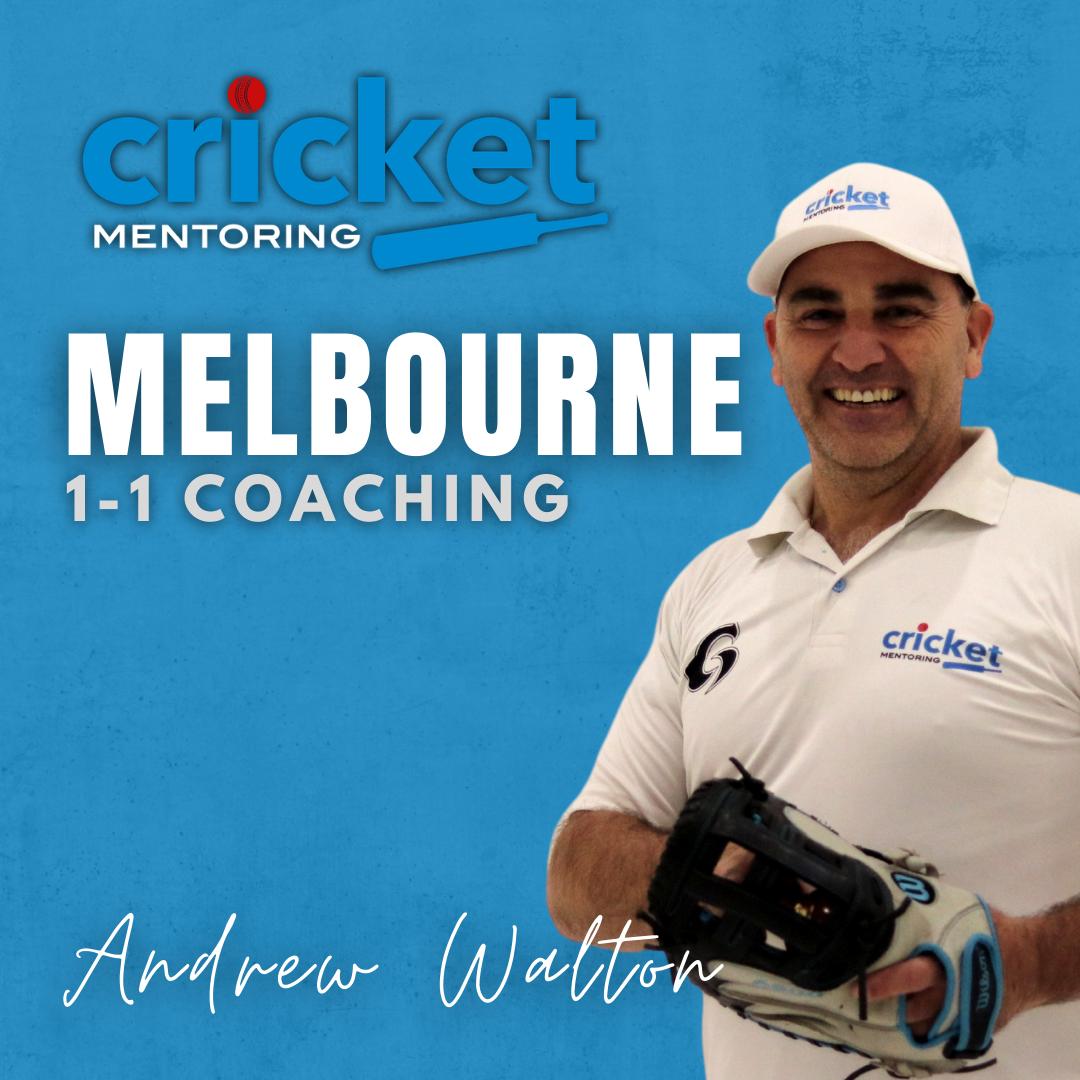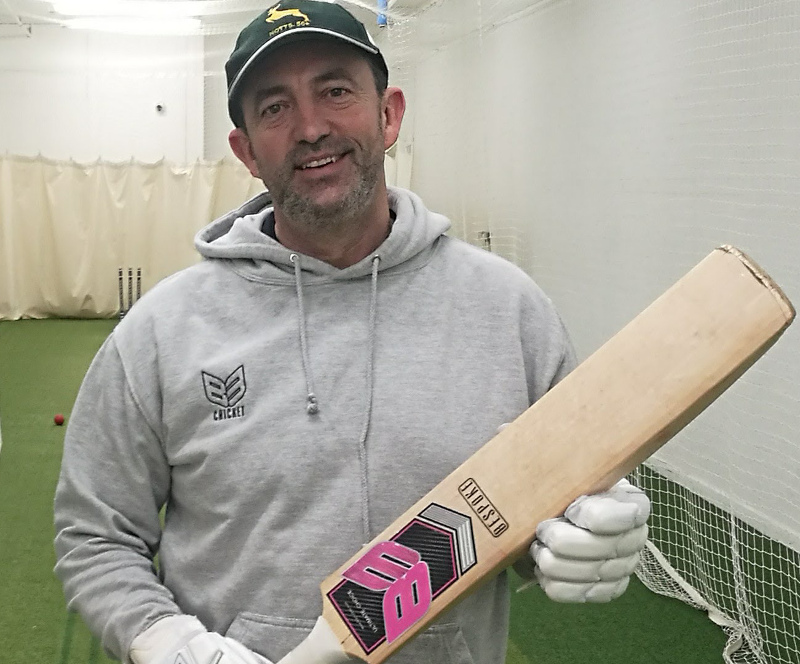About Me
Andrew Walton
Current Rating: 5 / 5
Cricket Coach Sports Tech World Series
https://cricketmentoring.com/ANDREW-WALTON/
Clifton Hill, Australia
+61417814281
Cricket Australia Level 3 coach, and as the head of coaching for Cricket Mentoring in Victoria, he is currently mentoring a number of cricketers of all ages and abilities in Melbourne. Andrew has previously been Head Coach in Premier Cricket Men’s cricket for a total of 11 seasons [Melbourne CC (3), Prahran CC (4), Fitzroy Doncaster CC (2) and Hawthorn Monash University CC (2)].
He also has international experience through regular annual visits (8) to the Karnataka Institute of Cricket (KIOC) in Bangalore and as a guest coach at Middlesex County Cricket Club during the 2014 season.
In 2018, Andrew was appointed by Cricket Victoria as Head Coach of the Blind Cricket team for the NCIC and has since been appointed by Cricket Australia as the Assistant Coach of the National Blind Cricket team.
He also has international experience through regular annual visits (8) to the Karnataka Institute of Cricket (KIOC) in Bangalore and as a guest coach at Middlesex County Cricket Club during the 2014 season.
In 2018, Andrew was appointed by Cricket Victoria as Head Coach of the Blind Cricket team for the NCIC and has since been appointed by Cricket Australia as the Assistant Coach of the National Blind Cricket team.
Partner Sponsors
My Activity
answered
Q: I am looking for a Leg Spin Coach in the Western side of Melbourne. If anyone knows of someone available, please get in touch for me. Thanks in advance! Luki
A: Fawad Ahmed also in the right location.
question
Q: Improvised, spontaneous leadership.
For the role of a cricket captain in the U10 team, the responsibility is handed over to a new player each week chosen by the previous captain.
The players work out a sense of fairness between themselves (most are in Grade 2 to 4).
As captain, they handle the batting and bowling order and who gets to be wicketkeeper.
Sometimes, the team list gets a little special, like this one from Tom 😀
Why sport is good, beyond the obvious, in building confidence and social skills.
For the role of a cricket captain in the U10 team, the responsibility is handed over to a new player each week chosen by the previous captain.
The players work out a sense of fairness between themselves (most are in Grade 2 to 4).
As captain, they handle the batting and bowling order and who gets to be wicketkeeper.
Sometimes, the team list gets a little special, like this one from Tom 😀
Why sport is good, beyond the obvious, in building confidence and social skills.
answered
Q: Adrian Jones - my best cricket captain
Although I was lucky to play under several excellent captains it would be hard to overlook the man who led our team during an extremely successful era and winning four premierships I was involved in at St Kilda Cricket Club.
Tim O’Sullivan was a terrific manager of ambitious cricketers. He did have a team of considerable talent which included a minimum of 4 state squad members at any one time. Sadly, they were mostly batsmen but that’s ok!
Not all players were playing for Victoria so when they all available to play club cricket Tim was able to manage the team and specifically the batting order so that all the batsmen were given the opportunity to score runs but also maintain a team ethos of playing for each other and also looking to win games of cricket which is what we all craved.
He was a good, clear communicator that ensured that everyone was on the same page going into a match but also that he would be the decision maker of how the team played.
He was also a thorough listener….and he needed to be!
He would often receive ideas and advice from players of significant experience within the playing group and he would need to weed out certain pieces of advice that may have had ‘self-interest’ attached or were too negative and not taking a team forward to get better, even by the smallest of percentages.
And despite being able to manage all these situations Tim was at his best on the field in the heat of battle usually when the circumstances were at their most challenging.
He scored a match winning century in tough conditions against Hawthorn-Waverley CC in a semi-final when no other batsman could even slightly look settled at the crease. Despite poor weather he also encountered a change to the playing conditions with play being held up on occasions that may have caused him to take risks too great to try and boost the run rate. That innings stood out clearly during that game and lead us to the first of four premierships the following week.
Although I was lucky to play under several excellent captains it would be hard to overlook the man who led our team during an extremely successful era and winning four premierships I was involved in at St Kilda Cricket Club.
Tim O’Sullivan was a terrific manager of ambitious cricketers. He did have a team of considerable talent which included a minimum of 4 state squad members at any one time. Sadly, they were mostly batsmen but that’s ok!
Not all players were playing for Victoria so when they all available to play club cricket Tim was able to manage the team and specifically the batting order so that all the batsmen were given the opportunity to score runs but also maintain a team ethos of playing for each other and also looking to win games of cricket which is what we all craved.
He was a good, clear communicator that ensured that everyone was on the same page going into a match but also that he would be the decision maker of how the team played.
He was also a thorough listener….and he needed to be!
He would often receive ideas and advice from players of significant experience within the playing group and he would need to weed out certain pieces of advice that may have had ‘self-interest’ attached or were too negative and not taking a team forward to get better, even by the smallest of percentages.
And despite being able to manage all these situations Tim was at his best on the field in the heat of battle usually when the circumstances were at their most challenging.
He scored a match winning century in tough conditions against Hawthorn-Waverley CC in a semi-final when no other batsman could even slightly look settled at the crease. Despite poor weather he also encountered a change to the playing conditions with play being held up on occasions that may have caused him to take risks too great to try and boost the run rate. That innings stood out clearly during that game and lead us to the first of four premierships the following week.
A: Great tribute Adrian, he was remarkable in the role as a leader.
answered
Q: Delissa Kimmince – my best captain
The best captain I played with was Meg Lanning.
Meg just always showed so much faith in her players. If I stuffed an over up and went for runs she would always give you another chance and for me that instilled a lot of confidence.
On top of that she was always very calm and level headed.
The semi-final against South Africa in the World Cup in 2020. I had to bowl the 3rd last over and she just told me to bowl my slow yorkers and keep it that simple and that just made that over so clear in my mind and allowed me to execute what was required
The best captain I played with was Meg Lanning.
Meg just always showed so much faith in her players. If I stuffed an over up and went for runs she would always give you another chance and for me that instilled a lot of confidence.
On top of that she was always very calm and level headed.
The semi-final against South Africa in the World Cup in 2020. I had to bowl the 3rd last over and she just told me to bowl my slow yorkers and keep it that simple and that just made that over so clear in my mind and allowed me to execute what was required
A: Clear direction from a captain with a confidence in the delivery, great reflection Delissa ⭐
question
Q: What's the batting order captain?
Add a little creativity and let it flow.
Add a little creativity and let it flow.
question
Q: In the chapter "On Batting" Chappell details how at a time when he was still coaching in state cricket (South Australia) and before the internet, he spent "several days in Melbourne, locked in a hotel room with Ian Frazer and Swan Richards watching hours of footage of all the top players. These included Sobers, Lara, Gilchrist, Chanderpaul and more to unlock the human movement elements within these players.
What they found was the fact that all the players shared a virtually identical position at the point of the bowler's release, despite finding all manner of different ways in which to get there.
Chappell describes it as the "active neutral" position. Basically meaning that at the point of release, their weight was mainly on the back foot but with their front foot lightly touching or just off the ground, ready to move forward if required by the early release of the full ball, or back if a delayed release meant the shorter ball.
What they found was the fact that all the players shared a virtually identical position at the point of the bowler's release, despite finding all manner of different ways in which to get there.
Chappell describes it as the "active neutral" position. Basically meaning that at the point of release, their weight was mainly on the back foot but with their front foot lightly touching or just off the ground, ready to move forward if required by the early release of the full ball, or back if a delayed release meant the shorter ball.
answered
Q: In the 1980s we were taught the importance of footwork when batting. A step to the pitch of the ball when the ball was pitched up and a step back in line with the ball when the ball was shorter.
There seems to be minimal feet movement in the modern-day player. The really good players still seem to play the ball late and under their eye line, but their footwork tends to be from the crease.
Has there been a change in coaching and if so how is it better for the batter?
I maybe wrong in my assessment but would like to get other people’s opinions.
There seems to be minimal feet movement in the modern-day player. The really good players still seem to play the ball late and under their eye line, but their footwork tends to be from the crease.
Has there been a change in coaching and if so how is it better for the batter?
I maybe wrong in my assessment but would like to get other people’s opinions.
A: Heading back from Darwin with the family in late September 2022, we stopped at a Westfield on the outskirts of Adelaide to grab some supplies of warm clothing from being in a cooler climate.
Wandering through the BIG W, I always find it hard to prevent myself from taking a look at the book specials.
Greg Chappell - Not Out
I had heard of this book being written during the pandemic period yet had missed going any further to seek at the time as a few colleagues had mentioned it was all right. Opening the cover to discover that it was co-written with Daniel Brettig convinced me to purchase it immediately. The $10 price tag is an unexpected bonus. 👍
As described in the Cricket Books section of Cricket Web:
This book should become de rigueur for every aspiring or established cricket coach in the world. Greg Chappell has set out what the elite player needs to possess to reach the top of the game. It might surprise that endless hours in the nets is not part of the Chappell doctrine. Instead, some basic techniques, a proper mental aptitude and as much as possible match simulation are considered to be of greater benefit. I won’t try and go into too much detail as it is a lot more complicated than my basic summary, however, it is so well set out in this book that you won’t have any trouble following the Chappell blueprint.
To answer the question here Terry:
In the chapter "On Batting" Chappell details how at a time when he was still coaching in state cricket (South Australia) and before the internet, he spent "several days in Melbourne, locked in a hotel room with Ian Frazer and Swan Richards watching hours of footage of all the top players. These included Sobers, Lara, Gilchrist, Chanderpaul and more to unlock the human movement elements within these players.
What they found was the fact that all the players shared a virtually identical position at the point of the bowler's release, despite finding all manner of different ways in which to get there.
Chappell describes it as the "active neutral" position. Basically meaning that at the point of release, their weight was mainly on the back foot but with their front foot lightly touching or just off the ground, ready to move forward if required by the early release of the full ball, or back if a delayed release meant the shorter ball.
Wandering through the BIG W, I always find it hard to prevent myself from taking a look at the book specials.
Greg Chappell - Not Out
I had heard of this book being written during the pandemic period yet had missed going any further to seek at the time as a few colleagues had mentioned it was all right. Opening the cover to discover that it was co-written with Daniel Brettig convinced me to purchase it immediately. The $10 price tag is an unexpected bonus. 👍
As described in the Cricket Books section of Cricket Web:
This book should become de rigueur for every aspiring or established cricket coach in the world. Greg Chappell has set out what the elite player needs to possess to reach the top of the game. It might surprise that endless hours in the nets is not part of the Chappell doctrine. Instead, some basic techniques, a proper mental aptitude and as much as possible match simulation are considered to be of greater benefit. I won’t try and go into too much detail as it is a lot more complicated than my basic summary, however, it is so well set out in this book that you won’t have any trouble following the Chappell blueprint.
To answer the question here Terry:
In the chapter "On Batting" Chappell details how at a time when he was still coaching in state cricket (South Australia) and before the internet, he spent "several days in Melbourne, locked in a hotel room with Ian Frazer and Swan Richards watching hours of footage of all the top players. These included Sobers, Lara, Gilchrist, Chanderpaul and more to unlock the human movement elements within these players.
What they found was the fact that all the players shared a virtually identical position at the point of the bowler's release, despite finding all manner of different ways in which to get there.
Chappell describes it as the "active neutral" position. Basically meaning that at the point of release, their weight was mainly on the back foot but with their front foot lightly touching or just off the ground, ready to move forward if required by the early release of the full ball, or back if a delayed release meant the shorter ball.
answered
Q: My son is 15 and has been told if he doesn’t get selected in the pathways system, he probably won’t make representative teams in the future. Is this true and how can we help him, he so passionate.
A: Hello Alex,
What a poor, narrow-minded and uninformed perspective for anyone to receive.
Did this come from a coach or selector?
From a positive perspective, please do some research on Peter Hatzoglou and the cricket career that is unfolding for him. Never been in the pathway of any sort ever.
Has not been a hinderance to belief and persistence.
Kind regards
Andrew
What a poor, narrow-minded and uninformed perspective for anyone to receive.
Did this come from a coach or selector?
From a positive perspective, please do some research on Peter Hatzoglou and the cricket career that is unfolding for him. Never been in the pathway of any sort ever.
Has not been a hinderance to belief and persistence.
Kind regards
Andrew
answered
Q: I read this article about Str8bat and wanted to ask cricket coaches what their opinion is of the new technology.
It's a sensor that's attached to your bat and the article suggests it helps improve batting techniques.
It's a sensor that's attached to your bat and the article suggests it helps improve batting techniques.
https://www.cricket.com.au/news/str8bat-cricket-technology-batting-360-view-sensor-real-time-analysis-players-coaches-buttler-zampa/2023-04-18
A: Hello Navneeth M,
Thanks for the response and extra information here, kindly appreciated.
I accept the invitation to try the latest version.
Over to you in making this happen.
Kind regards
Andrew
Thanks for the response and extra information here, kindly appreciated.
I accept the invitation to try the latest version.
Over to you in making this happen.
Kind regards
Andrew
answered
Q: I read this article about Str8bat and wanted to ask cricket coaches what their opinion is of the new technology.
It's a sensor that's attached to your bat and the article suggests it helps improve batting techniques.
It's a sensor that's attached to your bat and the article suggests it helps improve batting techniques.
https://www.cricket.com.au/news/str8bat-cricket-technology-batting-360-view-sensor-real-time-analysis-players-coaches-buttler-zampa/2023-04-18
A: I have had first hand experience with it during 2021 as part of a trial with Cricket Australia.
The claim that it can help improve batting technique can be regarded as true, yet in the end I was unable to convince myself that having this device was any better than using video analysis software and 30+ years of coaching experience in helping the player.
It is cumbersome in the set up process and connecting to the patches. The bat has to be in a specific position to sync with the program.
Feedback from players that it was ok to use in practice yet would not be comfortable in a match situation as can be a distraction.
Like many items of technology, useful, yet you have to have the time to set up, configure, make errors, learn and give feedback. A difficult thing to convince a person who is paying for the time to be coached and 12 to 20 minutes is being lost in getting set up and configuration completed.
Also being able to view information on screen if outdoors in sunlight is not easy.
Full time professional player in a controlled environment with plenty of time to fill, go for it 👍
The claim that it can help improve batting technique can be regarded as true, yet in the end I was unable to convince myself that having this device was any better than using video analysis software and 30+ years of coaching experience in helping the player.
It is cumbersome in the set up process and connecting to the patches. The bat has to be in a specific position to sync with the program.
Feedback from players that it was ok to use in practice yet would not be comfortable in a match situation as can be a distraction.
Like many items of technology, useful, yet you have to have the time to set up, configure, make errors, learn and give feedback. A difficult thing to convince a person who is paying for the time to be coached and 12 to 20 minutes is being lost in getting set up and configuration completed.
Also being able to view information on screen if outdoors in sunlight is not easy.
Full time professional player in a controlled environment with plenty of time to fill, go for it 👍
answered
Q: Does the captain of a cricket team have to be the best player in the team?
A: Great question Vijay, thanks for posting.
Here is a piece written and published on How To Help A Captain that hopefully has some valuable points for you to consider.
Kind regards
Andrew
Here is a piece written and published on How To Help A Captain that hopefully has some valuable points for you to consider.
https://cricketmentoring.com/how-to-help-a-captain
/Kind regards
Andrew















